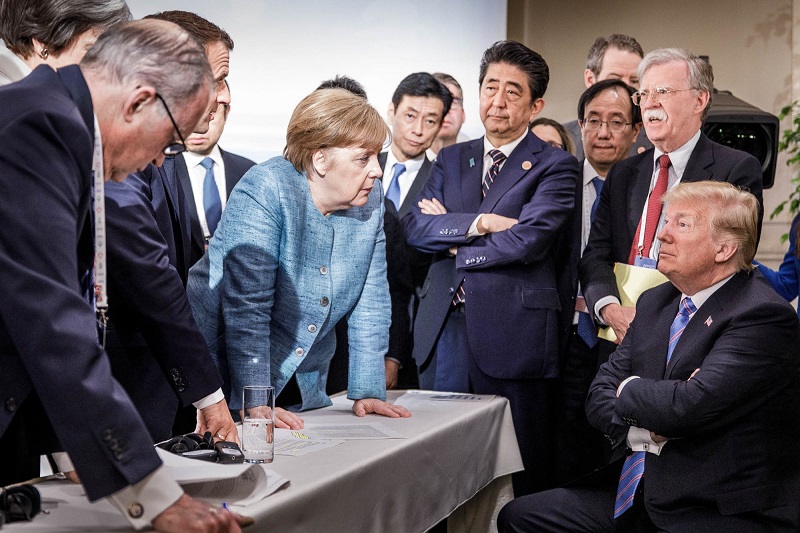The 10th Madeleine Award: glare and stare, wonder and ponder

No suspense this year. The winner is obvious: a masterpiece by the German official photographer, Jesco Denzel, wins the 10th Madeleine Award for the use of symbol, stunt, prop, gesture or jest.
The annual prize is inspired by former US secretary of state Madeleine Albright, who sent diplomatic messages via the brooches worn on her lapel. Albright’s messaging wasn’t about ‘read my lips’, it was ‘read my pins’: her favourite mistake was wearing a trio of monkey brooches to meet Vladimir Putin, causing the Russian to go ape.
In the Madeleine spirit, the judges were enchanted by claims the Queen trolled US President Donald Trump with her brooches. It’d be a wonderful bit of modern Elizabethan business from the monarch who ascended the throne when Winston Churchill was prime minister. The eloquence of the Queen’s brooches matches the ‘power and seduction’ of her hats.
The Denzel G7 photo, though, couldn’t be denied, an ‘instant classic, a picture of political drama that captures the power struggle of an age in a single image’.
As the University of Melbourne’s Kyla McFarlane commented, it’s a compelling image of ‘sleeves rolled-up, high-stakes political history being made in a room, in real time’.
Its powerful subjects are captured in a tense moment that not only encapsulates a political mood but also reveals something of the character of its subjects, as human beings as well as world leaders.
Trump, arms folded and jaw set, locks eyes with Merkel from across the table. Merkel, hands placed firmly on the table, stands up and leans in to his gaze. (It was in this extraordinary encounter that the memes saw school ma’am and truculent child, the stuff of an editorial cartoonist’s dreams.)
Around them, another narrative plays out. Macron engages animatedly with an open-mouthed John Bolton, Trump’s National Security Advisor, while Abe folds his arms and looks to Macron. The result is theatrical in its storytelling possibilities.
Trump flew direct from stare-off to Singapore (tweeting insults at Canada as he left) to do salute-and-handshake with North Korea’s Kim Jong-un. Along to report that wild ride, ABC correspondent Zoe Daniel marvelled: ‘Kim Jong-un is “talented”. Justin Trudeau is “dishonest and weak”. Friends are enemies. Enemies are friends. I’ve flown around the world and back this week and, man, oh man, is the water going backwards down the drain or what?’
Maybe Trump’s foreign-policy game theory is from the board game Dungeons and Dragons. He’s playing as a ‘chaotic neutral’, ‘an individualist, neither good nor evil, who cares little for rules or precedence and thrives in spontaneity. Chaotic Neutrals are motivated by promoting freedom, but can sometimes confuse freedom with selfishness’.
Ah, chaotic neutrality. Obvious …
Beyond The Donald, others put in strong Madeleine efforts. One image lingering from Malaysia’s extraordinary election—which ended 61 years of coalition rule by the United Malays National Organisation—is that a week after the vote, millions of Malaysians still displayed the purple ink on their index finger to show they’d voted.
When locations linked to defeated prime minister Najib Razak were raided, authorities needed six counting machines to tot up mountains of hoarded cash. They seized 12,000 pieces of jewellery and 567 handbags. Minor details tell so much: 567 handbags!
As Hong Kong had its umbrella revolution in 2014 (winner of the 6th Madeleine), so France has experienced its hi-vis mouvement des gilets jaunes. Yellow jackets, roundabouts and angry crowds make for powerful messaging.
In the minor awards, competition for the annual OOPS! Award for blooper and blunder was typically hectic. The OOPS! is known as a Boris, in honour of that wonderful former UK foreign secretary Boris Johnson. When sacked from shadow cabinet, many moons ago, Johnson commented: ‘There are no disasters, only opportunities. And, indeed, opportunities for fresh disasters.’ Masterful.
This year’s OOPS! goes to the hip chef in Israel who put shoes on the table for a dinner the country’s prime minister, Benjamin Netanyahu, gave for his Japanese counterpart, Shinzo Abe. Dessert was chocolate pralines served in two pairs of men’s black brogues. Puzzling for the leader of a country where you take your shoes off at the door, not on the table.
Another award is the Diana on ‘the utility and force of photographs ’, named for Diana, Princess of Wales, drawing on Tony Blair’s account of how the princess understood pix: ‘As Diana used to say, the picture is what counts.’
Because the G7 glare-and-stare photo gets the top Madeleine, the Diana can go elsewhere. Segue from a powerful woman staring down a powerful man to another steady gaze—not a photograph, but the official portrait of Australia’s first female prime minister, Julia Gillard.
While all the previous portraits were blokes in suits, Gillard took the wardrobe out of the picture. She ordered a portrait from the neck up, telling the ABC’s Annabel Crabb:
[O]ne of the things that I think is frustrating for women in leadership roles at the moment, still, is that there is endless commentary about what they’re wearing. For me, being the first female prime minister, there were times when it was just truly absurd. You’d be going in and out of a NATO meeting in Brussels to talk about our strategy for fighting a war in Afghanistan and people would be commenting on what jacket you were wearing. And so I did, in this, want to entirely take clothes out of the equation.
The final word from this year’s award goes to Madeleine Albright, still showing a policy brain as sharp as her humour. The first female US secretary of state—a child of war-torn Europe—has written another fine book, Fascism: a warning.
Musing on fascism in the time of Trump, Albright delivers a motto for the award that carries her name: ‘I am an optimist who worries a lot.’
